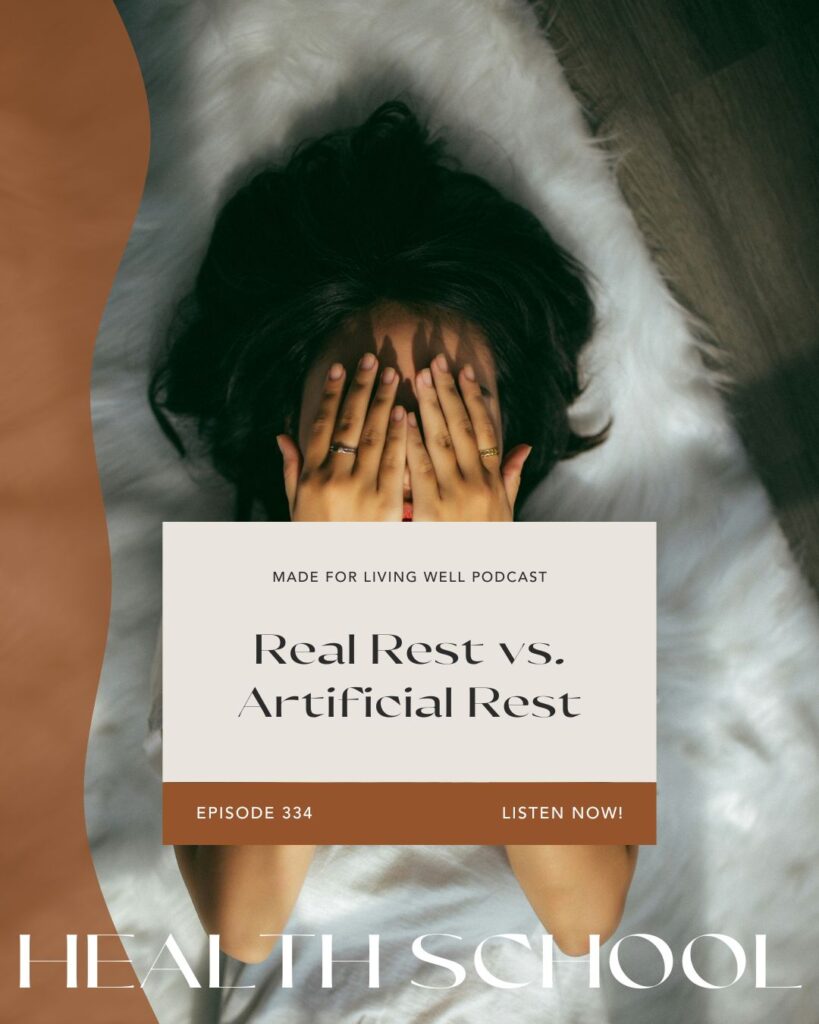Body, Health School, Life, Podcast, Soul

Listen on iTunes | Listen on Spotify | Listen on YouTube | Review the Podcast
I love the idea of a sabbath, but I find myself so busy that I often overlook it, thinking I don’t have time for it. It sounds like a good idea, but like most good ideas, even good intentions, the pulls of life have a way of overtaking them and making you feel like you don’t have time for them.
But I’ve realized this view is backward to what rest was intended to be.
Rest does not take your time but expands it. You may feel too busy to engage in rest-based activities, but what if the real view is understanding that you’re too busy not to?
There’s an old saying that says if you don’t choose rest, you’ll be forced to rest. Eventually, your energy threshold will break, and you will be forced to rest. That’s because God intended us to rest.
God didn’t design rest to take from our life but to give us life. He wants to expand our life.
In my old theology, what I call scary faith, God was a just God but not a good God. I lived believing I was being punished, and I started to view all of God’s commands as harsh, even extreme. They certainly were not a gift.
But the more I’ve learned about God, the more I’ve realized his commands are for our good and our protection. He did it to help us, not hurt us. That means when he called us to rest and to sabbath, it was for our good. And just how good that rest is doesn’t cease to amaze me.
In this podcast, I discuss redefining rest, recognizing the difference between real rest and artificial rest, and explaining why God calls us to rest.
What Does God Say About Rest?
The first encounter we have with rest in the Bible is on the seventh day of creation, found in Genesis 2:1-3.
When God created the heavens and the earth, he worked for six days, and on the seventh day, he rested not to take a break from creating but to marvel at it.
God called rest holy. He set it apart from all of the other days. While it may be a command, it’s essential to see it as holy and good and to further link that holiness to his encouragement in the New Testament.
In Matthew 11:28-30 Jesus says, “Come to me, all you who are weary and burdened, and I will give you rest. Take my yoke upon you and learn from me, for I am gentle and humble in heart, and you will find rest for your souls. For my yoke is easy and my burden is light.”
It may appear different from the command of rest in the Ten Commandments, but arguably, all the rest God speaks of comes out of a posture rather than a legality.
As John Piper has said, The Sabbath is not a day. It’s a person.
What is Rest?
Rest, like work, is a part of our humanity. It’s a part of our creation and because of that, both things are necessary and even good. Believing anything less about rest or work misunderstands the value.
Yet, we often misunderstand the creation of work and rest because of how our world defines them. Work has become a burden in many ways, and rest has been born out of scarcity. Both are views that limit God’s power and blessing.
But God created both work and rest for our good.
To clarify, the worldly view of rest comes from lack, when God created it out of overflow, abundance—specifically, His abundance.
The Scarcity of Rest.
When time feels scarce, often the first thing to go is rest. It’s easy to justify not resting when your to-do list is overflowing. I understand this all too well. I often find myself believing I don’t have time to do x, y, and z. I’m just trying to survive.
But isn’t that so cunning of the devil? He doesn’t make you discount the need for rest but rather makes you believe you don’t have time for it, even though you want it.
It’s close enough to the truth that it’s believable, but far away from God’s design, you never live the benefit.
Yet rest is critical because it was created by design, not to take form your life but to bless your life. It’s an expansion of your life, not a reduction or subtraction.
Recognizing the difference is the only way to receive the gift of rest.
The Rhythm of Rest
As I’ve fought rest in my life, giving up endless excuses for why I didn’t have time to rest, I assumed it was another subtraction from my life. Certainly, the idea of rest always sounds good, but just because it sounds good doesn’t mean it’s so easy to excuse.
I lived here and still tend to argue this point—I’ll rest when I’m dead.
But I’ve underestimated the rhythm of rest, blurring the lines between rest and work. Arguably, our entire world has become rather rhythmless. We live just far enough away from design that we become our own worst enemies because we fail to recognize the benefits of God’s rhythms.
God, in his perfect design, was very particular about rhythms.
He set bourndaries to our day and to our world that become their own rhythm. He created both day and night, seasons and months. He created time, and within time, and even our biology that follows time, there is always a rhythm.
How we honor that rhythm changes the outcomes we experience.
The Gift of Rest.
Rest is truly a gift.
Rest is better understood when you know it for more than sitting and sleeping. When God designed the Sabbath, it wasn’t to sit back and do nothing. It wasn’t to watch life go by but to live in awe of God’s design, to marvel and take part in his creation.
Rest was a moment of utter awe at all that God had done. It’s a moment of fully living life in the present.
Rest is the gift of living.
God spent six days creating, and on the seventh day, he experienced his creation. That’s what He wants rest to look like from us. It’s not about not living but living more abundantly. It’s not about lack or scarcity but an abundance.
I know it’s easy to miss the Sabbath’s purpose, but there is a lot to be said about God’s provision and taking a day to live in awe of that provision—not to work for it as if you have created it but to live in it because you believe in the one who created it.
The Sabbath is a form of surrender. It’s the best kind of surrender that breaks free of the restlessness and complacency so much of our world creates and to live in true rest, which is an abundance of peace.
Real Rest vs Artificial Rest.
Unfortunately, like most good gifts, we’ve idolized the command and created our own form of rest that is actually the opposite of rest. We may have had all the best intentions in the world, but we must clarify that rest doesn’t mean sitting.
It means living.
And there is a difference.
Of course, in some cases, you may need to sit to rest, nap, or refrain from any and all activities. But in other cases, you need to go out and do something—to get social, explore, and have an adventure.
Different seasons of life require different forms of rest. You must pay attention to what you need—to live or to nap.
In either situation, real rest is always filling. Rest is about adding to your life, energy, and soul, not taking away from it, and, ultimately, worshipping the one who has cared for your every need. To surrender to his will of creation so you can more fully honor the need for work.
This is why I find it necessary to reclassify rest, away from sitting, isolation, scrolling and binging to understand it might be sitting but it also might be hiking. It might be napping but it also might be gardening.
More than what you do, rest is a filling that comes from living surrendered to a person. That person is Jesus.
Don’t neglect rest. Don’t excuse it, but start to understand rest from this new perspective. Rest adds to your life. It fills you and becomes the source of eternal peace.
Rest is what allows you to live.
The next time you don’t think you have time to rest. Remind yourself you don’t have time not to.
WANT TO DEVELOP A RHYTHM OF REST?
You were designed for rhythms, and your biology craves rhythms. All of life lives within a rhythm, including a rhythm of rest.
Inside my NOURISH 30 Challenge, you will begin to explore healthy rhythms, God-given rhythms, including the rhythm of rest. The challenge is FREE!
SIGN UP HERE TO JOIN THE FREE NOURISH 30 CHALLENGE
Want to learn more about God’s Design For Your Body?
I have some amazing tools that teach you about your body and God’s design for it. That begins by believing you were made in health for health. Health is your design.
You will also enjoy these free resources:
- The Healing Power of Self-Identity
- 7 Lessons From Joshua
- Stop Worrying, God Has More For You
- Jesus Therapy: You Don’t Need a New Story
